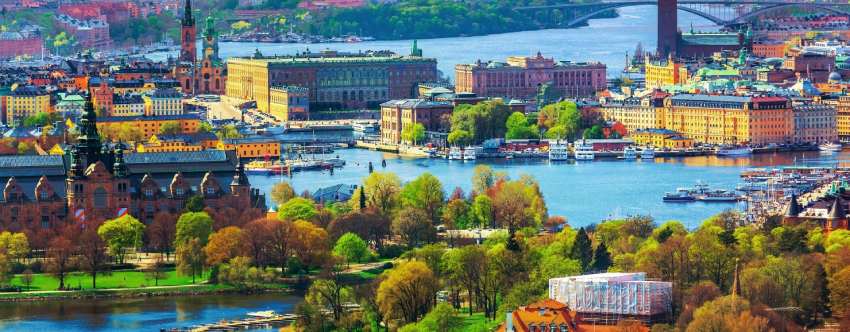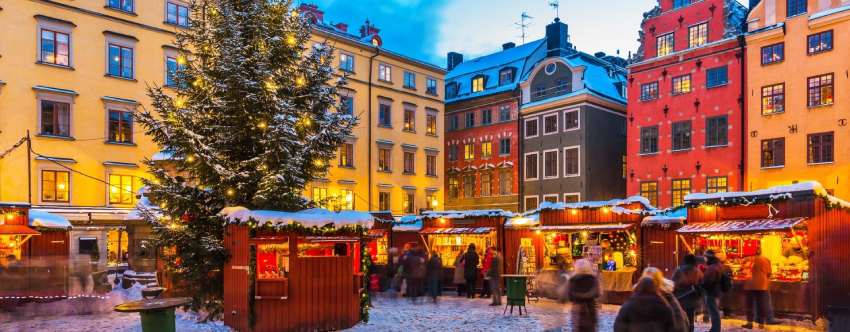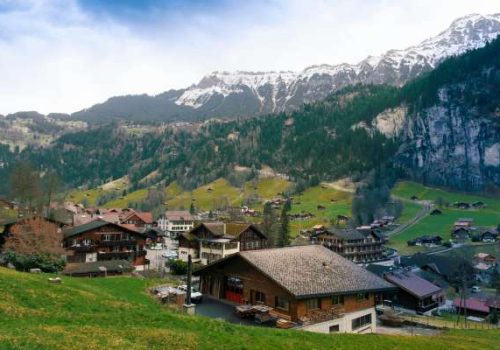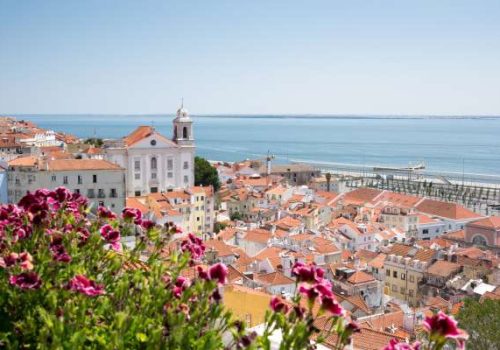Living and Working in Sweden
Information & guidance about seasonal jobs in Sweden
Have you always dreamt of emigrating to a northern wonderland? Look no further than Sweden! This stunning country boasts vast forests, shimmering lakes, and rocky landscapes, adorned with charming, colorful holiday homes.
Sweden, famous for Knäckebröd, Pippi Longstocking, and Ikea, also invites you to experience the magic of midsummer, encounter majestic moose, and savor delicious cinnamon rolls. As one of the least densely populated countries in Europe, Sweden offers ample room to live and work, making it an appealing destination for adventurous souls like you! 😉
Latest jobs in Sweden
We don’t have any jobs matching this search. Below you’ll find a selection of our most popular vacancies!
- Hotel jobs, Tourism
- Cyprus, Greece, Spain
- Adventure jobs, Hotel jobs, Tourism
- Bulgaria, Croatia, Egypt, Greece, Italy, Spain, Turkey
In large tourist areas such as Stockholm and seaside resorts, particularly along the coast between Malmö and Göteborg there are jobs in hotels, bars and restaurants.
Au Pairs usually need some childcare experience but won’t always need to be able to speak Swedish. Au pairs live with host families, looking after the children and perform basic domestic duties such as cleaning. Wages are often low but food and accommodation is usually included.
For harvest work, Skåne in the south of Sweden is a good place to start looking for crop-picking jobs.
If you intend to visit Sweden, on holiday, a business trip, to study, work, volunteer or as an emigrant you should get up to date and accurate information from the official website of the Swedish Migration Board.
For up to date information on visa requirements, you can also check with the Embassy or Consulate of Sweden before you travel.
Working in Sweden
Working conditions in Sweden
When it comes to working in Sweden, you’ll find a refreshing lack of rigid hierarchies in the workplace. Swedish managers are known for their open-mindedness and decision-making often involves consensus among team members. Another unique aspect is the “duz” culture, where everyone, including top-level managers, is addressed by their first name.
Swedes also value their “fika” breaks during working hours. These morning and afternoon coffee breaks provide opportunities to enjoy a cup of coffee, perhaps a pastry, and engage in casual work-related discussions or chat about various topics. It’s a time when even the boss happily joins in, fostering a friendly and approachable atmosphere among colleagues and superiors.
A typical working day in Sweden usually spans from 08:00 to 17:00, with a one-hour lunch break. Of course, this may vary slightly across different sectors. Additionally, Sweden is currently experimenting with six-hour working days to explore alternative work arrangements. Working from home is quite common and accepted, and part-time jobs are less prevalent due to the cultural emphasis on equality, with most men and women working full-time.
Swedes also prioritize long vacations, particularly during the summer months, where employees enjoy around 5 weeks of paid vacation time. It’s worth noting that during vacations, people might occasionally check emails or answer phone calls, but overall, the pace of work slows down. If you need something urgent from an office or company during the summer, be prepared to wait until the beginning of August for a response at the earliest.
Working in Sweden: Salary
Working in Sweden can be highly rewarding, especially when it comes to salary. The country boasts a high quality of life, providing employees with excellent working conditions and job security. On average, salaries in Sweden are relatively high compared to other European countries, with an average annual income of around 40,000 euros. Of course, individual salaries vary depending on the industry and level of experience, but overall, workers in Sweden can expect competitive earnings. Factors such as the specific industry, educational background, and years of experience play a role in determining one’s salary.
One notable aspect of Sweden’s work culture is its commitment to equality. Women and men typically receive equal pay for the same job, reflecting Sweden’s dedication to fairness and gender parity in the workplace. Overall, the country offers an appealing salary package and favorable working conditions, making it an attractive destination for professionals from all over the world.
Opening a Bank Account in Sweden
While Sweden is part of the European Union, it operates on its own currency, the krona, not the euro. If you receive your salary in a foreign bank account, like a German one, you may incur conversion fees. Moreover, many employers prefer to transfer salaries to Swedish bank accounts exclusively. To avoid complications, especially for long-term stays in Sweden, it’s advisable to open a Swedish bank account.
To open an account, you’ll need a personal number, along with an ID card or identity card, which is a straightforward process. Some banks may not require a personal number, but the procedure could be more complex. Visiting the bank of your choice will provide the best guidance and assistance. Additionally, it’s worth noting that in Sweden, both large and small transactions are commonly carried out electronically using credit or debit cards. Some of the major Swedish banks include SEB and Swedbank, among others.
Working in Sweden: Taxes
If you earn your income in Sweden and are a resident there, you are required to pay taxes in the country. Sweden has a relatively high tax burden, especially for individuals with higher incomes. Employees in Sweden are subject to an income tax rate of approximately 30%. For those earning above a certain salary threshold, taxes progressively increase, reaching a top tax rate of 57%.
In addition to income tax, there is a value-added tax (VAT) of 25% imposed on nearly all goods and services. However, Sweden also offers an extensive system of tax credits and deductions, which can help alleviate the tax burden for individuals. These credits and deductions cover various expenses, such as childcare costs, health insurance premiums, and educational expenses.
Social security, health insurance, and pension contributions are among the services funded by income tax. While the overall tax burden in Sweden can be substantial, the country provides an array of benefits and social guarantees that hold significant value for many people.
Working in Sweden as a German, Austrian, or Swiss Citizen
If you are a German, Austrian, or Swiss citizen planning to permanently emigrate to Sweden, it is essential to register with the Swedish tax office Skatteverket.se. Registering is the first step to obtaining a personal number in Sweden, which is necessary for various legal matters. It is important to have all required documents, such as a passport, visa, proof of accommodation, and financial means, ready for a smooth and efficient registration process. Please note that it may take a few weeks before you receive your personal number.
Once you are registered, you are eligible to work in Sweden and enjoy the same benefits as Swedish citizens.
Working in Sweden without Language Skills
While it is not impossible to work in Sweden without knowing the Swedish language, it can be challenging. Many employers in Sweden prefer applicants who speak the local language, as it facilitates communication within the company and aids in team integration. Although most Swedes are proficient in English, they appreciate the effort if you try to communicate in their native tongue.
Nevertheless, there are opportunities for individuals without Swedish language skills to work in Sweden. International companies that use English as their business language, such as Volvo, Spotify, Electrolux, Klarna, Ikea, Skanska, Scania, Astra-Zeneka, and H&M, often welcome English-speaking applicants.
In certain sectors like gastronomy or the IT industry, language skills are less critical. It is recommended to conduct research and reach out to potential employers to gauge their openness to applicants without Swedish language proficiency.
However, it is still advisable to consider taking a language course and learning Swedish while in Sweden. This can increase your opportunities and enhance integration into Swedish life.
Working in Sweden: Important Industries
Sweden boasts several crucial sectors with significant employment opportunities. The service sector is one of the largest, encompassing healthcare, education, finance, and tourism, providing jobs to many individuals. Additionally, the country places great emphasis on industries such as mechanical engineering, electrical engineering, and IT.
Sweden has also become a hub for start-ups and innovative technology and e-commerce companies. Notably, the country’s key export industries include paper and wood processing, food, textiles, and chemical products.
The agricultural sector in Sweden comprises numerous small businesses specializing in high-quality food production, such as cheese and meat. Overall, Sweden offers diverse career opportunities across various industries and sectors.
Working in Sweden: Professions
Sweden offers an array of sought-after professions. Examples include engineers, teachers, IT professionals, handymen, electricians, bricklayers, truck drivers, doctors, and nurses. Professions in the care sector, such as geriatric nurses and midwives, are particularly in demand. Furthermore, there is a high need for skilled workers in renewable energy, logistics, and e-commerce fields.
It is crucial to recognize that Sweden requires qualified professionals with the necessary expertise to excel in their roles. As such, seeking quality training and further education early on is advisable to secure an attractive job in Sweden.
Many individuals take the first step towards establishing themselves in Sweden by pursuing higher education there. Given that studying in Sweden is free for European citizens and the country’s education system is renowned globally, it is a popular destination for young people seeking university opportunities.
Moreover, working on a farm in Sweden for a few months, such as on a husky farm in Swedish Lapland, is a dream for many Germans. Campsite jobs also frequently seek applicants with language skills to communicate with international visitors. For such positions, a work & travel stay or a gap year in Sweden is an ideal choice, often offering free accommodation and food in exchange for labor.
Working in Sweden: Finding a Job
When searching for employment in Sweden, there are several avenues you can explore. One option is to directly apply to companies that pique your interest. Alternatively, you can utilize the services of the Swedish employment office, Arbetsförmedlingen, which offers a wide range of job opportunities in various industries, and allows you to apply online.
Another approach is to apply through recruitment agencies or headhunters, who will assist you in finding a suitable job. They will connect you with companies, alleviating the application process, and leaving you to focus on impressing during the interviews. Regardless of the path you choose, having a good command of English is essential. Proficiency in Swedish is even more advantageous.
You can also explore job listings in Swedish newspapers like Svenska Dagbladet or Dagens Nyheter.
For more tips, tricks, and information about working in Sweden, valuable resources include nordicway, the German-Swedish Chamber of Commerce, the German Embassy in Stockholm, and the Swedish Embassy in Berlin. These sources can provide valuable insights and guidance to support your job search and transition to working in Sweden.
Applying for a Job in Sweden
When applying for a job in Sweden, there are key considerations to bear in mind. Firstly, ensure your CV is written in either Swedish or English, as most Swedish employers require this. Providing a Swedish phone number will also facilitate easy communication.
Emphasize your language skills in the application and, if applicable, include relevant certificates. Thoroughly research the company and the desired position, enabling you to address specific requirements in your application. Crafting a professional cover letter and presenting a neat appearance will leave a positive first impression. Being well-prepared and maintaining a professional demeanor are vital to successfully securing a job in Sweden.
During the interview, expect discussions on your experience and skills and how you envision applying them to the new role. Your future plans and commitment to the company will likely be topics of conversation as well. Be open, honest, and prepared to answer the interviewer’s questions. While showcasing your strengths, avoid appearing overly assertive. Sweden places importance on a positive working atmosphere and teamwork, so demonstrating your ability to collaborate effectively is beneficial.

Living in Sweden
Benefits of Living and Working in Sweden
For nature lovers, Sweden offers an ideal home. The country’s vast wilderness invites exploration through activities like hiking, camping, sailing, and skiing, especially in the northern regions. Embracing Swedish culture, sleigh rides with native reindeer are a popular and enchanting experience. Sweden’s historical charm endures with well-preserved fortresses and medieval city walls.
While nature draws many, Sweden’s vibrant cities, such as Stockholm and Malmö, also captivate with their unique allure. The annual Midsommar festival brings the entire country together in celebration, adorning metropolises and towns with colorful traditional decorations. Swedes joyously partake in singing, dancing, and sometimes even donning vibrant costumes during this festive occasion. A centerpiece of the festival is the Midsommar tree, accompanied by a feast of delicious dishes.
Throughout the year, Swedish style reflects a fusion of functionality and elegance, embodying the practicality and tidiness for which Swedes are renowned. This sense of orderliness often extends to the workplace.
Sweden offers an array of compelling reasons to embark on an adventure. From its breathtaking natural wonders to its rich cultural traditions, working abroad in Sweden promises a rewarding and unforgettable experience. Here are nine compelling reasons why choosing Sweden as your work destination is truly worth it.
Accommodation in Sweden
When relocating to a new place, it’s often wise to start with a temporary rental, such as through Airbnb. This approach allows you to take the time to explore different neighborhoods and find an area that suits your preferences.
Keep in mind that rental costs in Sweden, like many other expenses, tend to be higher compared to Germany. On average, a one-room apartment in smaller cities can range from €700 to €800 per month, but this figure drops to around €600 per month outside of city centers. In major cities like Stockholm, Gothenburg, or Malmö, rental prices can be significantly higher, particularly depending on the location within the city.
It’s essential to understand that the housing market in Sweden differs significantly from that of Germany. Finding a long-term rental from private individuals can be challenging as many landlords are not permitted to use their properties solely as investments and must reside in the apartments themselves. However, in certain circumstances, they can rent them out for up to three years, such as when moving in with a partner or relocating to another city or country. Nevertheless, these rental agreements are generally temporary and not intended for permanent arrangements.
As a consequence, many Swedes eventually opt to purchase their own homes. Interestingly, the restrictions on using apartments as investments help keep housing costs reasonable, even in major cities. As a result, financing an apartment purchase in Sweden is often more feasible than one might expect, especially given the attractive housing options available in larger cities.

Transportation in Sweden
Public transportation in Sweden is highly efficient and well-developed, particularly in major cities. Even without a car, getting around cities is a breeze, thanks to the comprehensive public transport network.
Swedes heavily rely on public transportation, which includes city buses, subways, and trams in larger and medium-sized cities. Trains are also a popular choice for travel, offering a fast and comfortable way to get around.
Public transport in Stockholm
Stockholm boasts an extensive network of trains (T-bana), buses, and the metro system. During the summer months, visitors can even enjoy a historic tram line that runs from the city center to the picturesque island of Djurgården. For those staying in Stockholm for an extended period, it’s convenient to purchase a 24-, 48-, or 7-day pass, which provides access to all areas of the city.
Public transport in the Skåne region
In southern Sweden, particularly around Malmö, public transport is known as Skånetrafiken. This efficient system comprises buses and trains that connect the entire Skåne region. Additionally, there are trains and buses connecting to destinations in Denmark, Gothenburg, and Alvesta.
Food in Sweden
Contrary to misconceptions, Swedish cuisine offers a delightful range of dishes that extend beyond canned fish. While the country’s geographical location encourages a focus on fish-based dishes, the popular Köttbular (meatballs) are equally beloved. For dessert, a traditional Frödinge cheesecake or a delectable Prinsesstårta (princess cake) are often enjoyed during celebrations.
Sweden also boasts a collection of typical Swedish dishes, with saffron being a prominent spice. The Lussekatt sandwich, a soft wheat bun adorned with sultanas, is a famous Swedish saffron dish. Alongside Midsummer, Christmas is another significant holiday in Sweden, with a traditional Christmas buffet featuring a large ham and plenty of baking incorporating the expensive saffron.
In Sweden, it is customary to have two hot meals each day. With many Swedes enjoying hunting and fishing, game and fish dishes are prevalent, often served with cranberries and mushrooms (svamp). The national drink, aquavit, a type of gin, is also an integral part of Swedish culinary culture.
Nightlife in Sweden
While Scandinavian cities may not be as liberal as Amsterdam or Berlin in terms of alcohol and opening hours, the weekends in Stockholm are vibrant and full of life, with cocktails, beers, and endless glasses of champagne.
To purchase alcohol from Systembolaget, the state-run liquor chain, one must be at least 20 years old, and strict controls are in place. Nightclubs, bars, and restaurants also serve alcohol, with the age limit set at 18 years, though it can be higher, sometimes at 23 or 25 years. However, alcohol in Sweden is not known for its affordability. To save on expenses, it’s common to follow the Swedish tradition of having a pre-party at home before heading out for the night.
Due to the stringent alcohol policies, some clubs, especially in larger cities, are situated outside the city center. To gain access to these clubs, it is often necessary to register online beforehand. In the summertime, open-air raves or “Skogfest” and forest parties are held on the outskirts of major cities.
Here are some of the best bars in Sweden:
Tudor Arms: Often dubbed the “best pub in the world” by British visitors, it’s a favorite spot for emigrants seeking good food, football, and quiz nights.
Spy Bar: This chic and trendy bar features a good DJ and becomes increasingly busy as the night progresses.
Kvarnen: Offering two beer halls under one roof, a great spot to enjoy a variety of beers.
Absolut Ice Bar: Located in the Nordic Sea Hotel, this unique bar maintains a constant temperature of -5ºC. Drinks are served in glasses made of ice, and even the walls and furniture are carved out of ice.
Malmö, the third-largest city in Sweden, also boasts an incredibly vibrant nightlife. For those seeking a night out, Lilla Torg Square is the place to be, especially during the summer months when it becomes the heart of the party scene.

The landscape and nature in Sweden
The landscape and nature in Sweden are truly breathtaking and captivating. With its vast and sparsely populated regions, Sweden offers a haven for nature lovers. From the pristine wilderness of Swedish Lapland, Europe’s last true wilderness, to the rugged mountains and dense forests, there is so much to explore and discover.
For those who enjoy outdoor activities, Sweden’s extensive network of national parks and hiking trails beckons. Whether it’s going for walks amidst the lush forests, embarking on exhilarating hikes, or island hopping through the picturesque archipelago along the coast, nature is always close by, inviting you to immerse yourself in its beauty.
In the dynamic capital, Stockholm, often referred to as the “Venice of the North,” the city’s charm lies in its spread across 14 islands. Connected by bridges and ferries, exploring Stockholm offers a delightful mix of legendary design, cultural attractions, and historical wonders. The enchanting Gamla Stan, the oldest part of the city, is a must-visit for its historical significance and vibrant atmosphere.
Southern Malmo, a lively student city, provides a wealth of experiences. From trendy cafes, restaurants, and designer shops to impressive cultural landmarks like Malmö Konsthall and Malmöhus Castle, there is no shortage of things to do and see.
Swedish Lapland, a nature reserve and UNESCO natural heritage site, beckons with its breathtaking landscapes of mountain ranges, glaciers, and unique cultural heritage. Visitors to this region have the extraordinary opportunity to stay in a real ice hotel, an unforgettable and magical experience amid the frozen beauty of Jukkasjärvi.
The High Coast, a UNESCO World Heritage site, is a mesmerizing stretch along the Gulf of Bothnia’s east coast. With Skuleskogen National Park and Västanöfallet nature reserve, it showcases the stunning and typical Swedish coastal landscape.
For enthusiasts of Viking history, Foteviken presents an authentic and captivating reconstruction of a Viking village. Visitors can stroll through thatched and turf-roofed houses and experience the village, inhabited by people who embrace and preserve the Viking traditions and way of life.
In the charming village of Abisko, many gather in hopes of witnessing the awe-inspiring Northern Lights. Its location near the North Pole and the surrounding darkness make Abisko an ideal spot to catch a glimpse of this mesmerizing natural phenomenon.
Indeed, Sweden is a treasure trove of natural wonders and cultural experiences, offering an enriching and unforgettable adventure for anyone seeking to immerse themselves in the splendor of this remarkable country.
Visa and Residence in Sweden
If Sweden is your chosen destination for your next adventure and you are an EU citizen, you won’t need a work permit, regardless of your intended stay duration. However, if you plan to stay longer than 3 months, you must obtain a residence permit, which should be confirmed by the Swedish immigration authorities within 90 days at the latest. To obtain a residence card, you’ll need to demonstrate your ability to financially support yourself during your stay.
Healthcare in Sweden
Healthcare in Sweden boasts exceptionally high quality, and accessibility to services is a priority for all citizens. The healthcare system is transparent and citizen costs are relatively low since they are financed through taxes.
A country’s healthcare can be gauged by its average life expectancy, and in Sweden, this is remarkable. Swedish men live to an average of 79.1 years, while Swedish women have an average life expectancy of almost 83.1 years, resulting in an overall average of 80.8 years.
Among the counties in Sweden, Halland boasts the highest life expectancy, with an average of 82 years. Additionally, Uppsala, Kronoberg, Jönköping, and Blekinge achieve commendable results.
For those with a personal number in Sweden and who reside and work there permanently, automatic insurance coverage is provided, enabling access to medical care from doctors and hospitals. Most of the costs are covered by Försäkringskassan.se, although there is a small excess for everyone. However, any remaining costs beyond a certain amount are covered by the health insurance company.
Security in Sweden
Sweden is generally regarded as a very safe country with no particular security risks. However, as with any place in the world, it is wise to exercise caution and avoid walking alone in dark alleys at night. By being mindful and taking common-sense precautions, you can enjoy a secure and enjoyable experience in Sweden.








